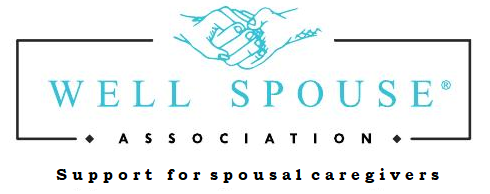ABOUT THE BOOK
Maybe caregiving is new to you. Perhaps your spouse’s needs have abruptly appeared, and you’re trying to adjust to a “new normal.” It’s also possible that you’ve been a caregiver for a long time. Maybe you’ve spent years helping your spouse, watching him or her advance through the challenges of chronic illness, degenerative conditions, or disability.
Whatever the circumstances are, you didn’t randomly unite with the Well Spouse® Association. People don’t impulsively investigate or read about caregiving. They become interested in caregiving when it personally affects them.
I was in your situation and it changed my life. That’s not an exaggeration. Caregiving changed my life. Here’s how it happened:
Twenty years ago, my work involved writing national healthcare policy for elderly and disabled people, but I didn’t have a clue about what illness, aging, and end of life meant until my mother-in-law discovered she had a brain tumor.
Following discharge from the hospital after brain surgery, Mom moved into our home, and my wife and I unwittingly became her caregivers. Although her cancer went into remission, she required ongoing care due to the steady and prolonged cognitive decline resulting from her brain surgery. My wife and I cared for her mother for more than five years. When Mom’s cancer returned with a vengeance, she opted not to pursue further treatments. She died a few months later, which was a blessing because her mind had not yet completely disappeared.
Within a year, I bought a home care company in order to help families like mine. Over time my company supported thousands of families, and I was struck by the distinctive stories but similar experiences of each family we served. Caregiving had changed every one of them.
I subsequently studied caregiving in connection with my doctoral dissertation. Research opened my eyes, my mind and my heart to so much that I had never understood about caregiving
It was research findings that ultimately taught me how and why we are changed by caregiving.
Understanding the Caregiving Experience
In speaking with caregivers today, I describe caregiving as a series of role-based transitions precipitated by the emerging needs of the care receiver. I frame the caregiving experience with four words, each of which begins with the letter “R.” The social dimensions of caregiving can be analyzed in terms of:
- ROLES: defining the symbiotic caregiver and care receiver roles;
- RELATIONSHIPS: honoring the historic relationship between caregiver and care receiver while recognizing relational changes imposed by caregiving;
- REALITIES: confronting situational realities, including marginalizing assumptions about the human body, the limitations of medicine, and what actually matters most to people who are dying; and
- REWARDS: cultivating the rewards of caregiving, including tender moments with the care receiver, the discovery of a higher purpose or different world view, or knowing your loved one is receiving the best care.
By applying the four R’s of caregiving to our individual lives, the changes that we experience as caregivers can be better perceived. This framework, which I call the social code of caregiving, offers a deeper view into things we experience but can’t necessarily articulate as caregivers. Reference to the social code of caregiving enables us to identify and explain what is happening to us when we undertake caregiving responsibilities for a loved one.
I invite you to brainstorm, using this framework of the four “R” words applied to your personal caregiving journey, to contemplate how caregiving has changed you.
—Dr. Blight is a member of the WSA Honorary Board and the founder of Caregiving Kinetics.

Follow us on